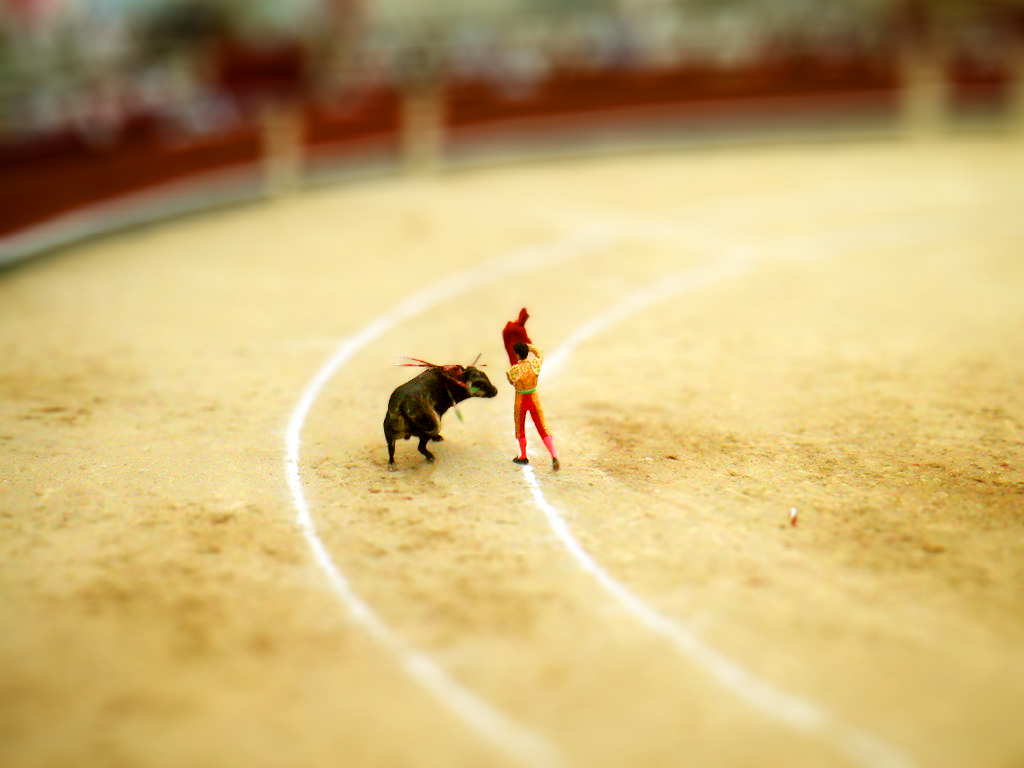On the Ethics of Bullfighting
In 2011, Catalonia’s Parliament introduced a ban on bullfighting. Now, this has been overturned by Spain’s Constitutional Court. The rationale for the new ruling is that, in 2013, Spain declared bullfighting a national cultural heritage, and no local government has the power to ban festivities that are part of declared cultural heritage.
The dispute goes way beyond the concern for animals. It is actually a microcosmos of Spain’s culture wars. Bullfighting was intensely promoted by Francisco Franco’s Nationalist Catholic regime. It thus became a symbol of España caní, traditional Spain: a strong association of politics and Catholicism, authoritarianism, martial values and bravery. Forty years after Franco’s death, interest in bullfighting is declining. Yet, it is still a deeply divisive issue in Spanish public opinion, due to its nationalist overtones. Bullfighting became one of Spain’s most recognizable symbols. Nationalists in regions hoping to secede from Spain (such as Catalonia), naturally oppose bullfighting. Sadly, the debate is much more about Spanish and Catalonian nationalism, than about animal welfare.
Proponents of the continuation of bullfighting tend to be less educated. But, that does not stop relevant contemporary philosophers (such as Fernando Savater) and novelists (such as Mario Vargas Llosa) from supporting bullfighting. Their argument mostly relies on communitarianism. Bullfighting, so they claim, is deeply enshrined in Spanish volksgeist, and it reinforces a healthy sense of community. Bullfighting provides a great deal of aesthetic inspiration for the Spanish arts, and if banned, it would constitute a huge loss of cultural heritage.
Opponents claim there is nothing aesthetic about killing bulls. They are wrong. We may argue whether or not torturing and killing bulls for sheer entertainment is ethical, but the music, the colors, and the excitement of crowds certainly arouses deep aesthetic emotions, and has been the subject of great operas (Bizet’s Carmen), novels (Heminghway’s Death In The Afternoon), and engravings (Goya’s La tauromaquia). Contrary to what Plato believed, good and beautiful do not always coincide; ethics and aesthetics are not identical.
Yet, the standard to judge the morality of bullfighting should not be whether it is beautiful or not, but actually, whether or not we are ethically authorized to torture animals for entertainment. The fact that bullfighting is an ancient Spanish tradition (although it is not as ancient as it is usually claimed to be) provides no argument whatsoever. Many horrible things have been deeply enshrined in tradition (slavery, child marriage, female genital mutilation, etc.), but that in no way justifies them. To do so would be to fall in the relativist trap.
Utilitarianism is usually employed as an ethical doctrine in order to defend animal rights. One of the most important defenders of the ethical treatment of animals, Jeremy Bentham, was a utilitarian philosopher. And, the most important contemporary ethicist defending animals’ rights, Peter Singer, is also a utilitarian. But, perhaps, utilitarian calculations could be used to, in fact, support bullfighting, although this is very seldom done in Spain.
There seems to be some inverse relationship between hooliganism and violent sports. In Spain, soccer (a relatively peaceful sport) attracts lots of hooligans, and over the years, outbursts of racism and violence have been more common in the stands of soccer stadiums. Bullfighting crowds, on the other hand, are very well-behaved. This has prompted some speculation about whether violent entertainment may actually serve as catharsis for crowds, a way to channel violence. Psychologists still debate this issue, but for the most part, the academic consensus is that the catharsis theory (which also applies to violent video games) is wrong.
Yet, if it could be proven that, indeed, killing one bull appeases crowds and effectively reduces rates of violence amongst humans in a significant degree, then utilitarian ethicists would be forced to admit that the search of the greatest happiness for the greatest number may allow for bullfighting. But again, this is mere speculation.
The only serious argument that proponents of bullfighting may propose is almost never voiced in Spanish public debate, but it actually has had some defenders in philosophy: animals have no moral standing. Peter Cathurrers, the most eloquent contemporary defender of this view, holds that animals do not have self-consciousness, and thus, feel no pain. There may be moral reasons not to harm an animal, but they have to do with the way that it affects other human beings, not with the welfare of the animal itself (in the case of bullfighting, other people may be offended by the spectacle, but taking offense at something is not necessarily a sufficient reason to outlaw it or declare it immoral).
Ultimately, the crux of the ethical debate on bullfighting bogs down to a fundamental question in the philosophy of mind: can animals feel pain? Most philosophers believe so, and thus, they argue that we have moral obligations towards animals, because just like us, they are capable of suffering. How do we know that animals suffer? By making analogies, in the same manner that we know that other human beings can feel pain. We have no access to other people’s minds. But, when we see them scream and shiver, we conclude that they are in pain, as that is the expression that we make when we feel pain. The same applies to animals.
Nevertheless, there is a complication. A computer could be programmed to scream and shiver every time a particular key is pressed. Does that mean that the computer is in pain? Hardly: it’s just a machine mindlessly producing sounds. We may argue whether or not, in the future, a machine may feel emotions, but that is not the point. The point is that, just making sounds is not a guarantee of feeling pain. Why, then, couldn’t a bull be just an object that mindlessly shivers without actually feeling any pain? It certainly makes for an interesting philosophical debate. However, don’t expect Spanish public opinion to frame the bullfighting debate in these terms. It will mostly be nationalist irrationality.





